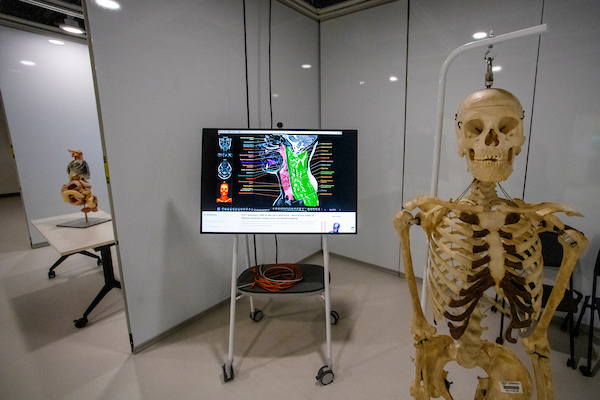
The Morsani College of Medicine and Microsoft worked together for two years to figure out how to integrate innovative technology and approaches to learning into the new MCOM and Heart Institute in downtown Tampa. The result was the first medical school of innovation in which medical students use Microsoft technology to augment their medical education.
When the Florida Board of Governors ordered all state universities to transition fully to remote learning beginning on March 23 because of the pandemic, the staff and faculty of MCOM were ready to pick up exactly where they left off.
Bryan Bognar, MD, MPH, vice dean of the MCOM Office of Educational Affairs and chief academic officer, said the transition to remote classes was not difficult because of the “unseen infrastructure” that already existed within MCOM’s building design.
For example, the new building includes easier ways for students to collaborate and connect with each other and with faculty, with technology allowing for more real-time interactivity for coursework, and with group learning allowing for increased flexibility in the location of the learner and educator. Plans also included seamless remote access to real-time courses and group learning that gives students and faculty greater flexibility for maintaining active participation in coursework, regardless of location – a fortuitous effort considering the current COVID-19 situation calling for full remote learning across the nation’s universities.
Dr. Bognar gives the example of the students’ use of Canvas and Panopto to record large group lectures, supplemented by Microsoft Teams for group meetings, for showing how students and faculty were able to “pivot pretty quickly” as he describes it. Two months ago, it was inconceivable to think there was 100% attendance for any of the live lectures, Dr. Bognar said. Many students reviewed lectures via recording in real-time or on the same day.
“As a prelude to our move to the new downtown building, MCOM went through single tenant consolidation, began early adopter deployment of Microsoft Teams and partnered with Microsoft to become the first ever Medical School of Innovation,” said Dr. Bognar. “Little did we realize at the time that these efforts would allow us more seamlessly move to a live online environment necessitated by COVID-19. It has allowed us to innovate in the face of the barriers imposed by social distancing including virtual standardized patient visits, remote delivery of exams, as well as real-time group and individual check-in meetings.”
Going totally remote was an easier transition for the first- and second-year students, and a little more difficult for third- and fourth-year students since much of their clerkships are done in hospitals and other medical office settings. However, with the use of Microsoft Teams, standardized patient interactions have become virtual, similar to how USF Health is currently conducting telehealth for patient care.
“The pandemic may have pulled the plug on our in-class discussions and small-group learning activities but fortunately our medical school was newly designed for the future and the challenges that follow. MCOM has made it a priority to keep us up-to-speed throughout the pandemic and provides us with the tools to keep making progress in our studies. It has been well over a month since we’ve began distance learning using our school’s online infrastructure, but my peers and I are still able to stay connected, keep motivated and share a couple of laughs while studying.”
– Tampa Hutchens, MCOM Class of 2022
